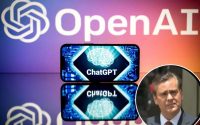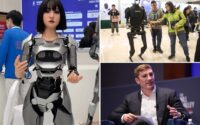Google CEO Sundar Pichai grilled during Google Play trial
Google CEO Sundar Pichai took the witness stand on Tuesday in the search giant’s antitrust trial versus “Fortnite” maker Epic Games — and immediately faced aggressive grilling over the tech behemoth’s record-keeping practices.
A lawyer for Epic Games fired off questions at Pichai regarding the video game publisher’s accusations that the Google boss has encouraged internal communications to be hidden from enforcers scrutinizing the company for antitrust violations, according to Bloomberg.
Responding Tuesday to questions from Epic’s attorney Lauren Moskowitz, Pichai said he marked some emails with the attorney-client privilege tag as he was instructed to do when he was seeking legal advice and also so they “would not be forwarded,” per Bloomberg.
The practice is part of Google’s “Communicate with Care” program, under which staff were instructed to excessively copy company lawyers on internal conversations, even when they didn’t technically need to.
Staffers were encouraged to have sensitive conversations over chat with the history function turned off, meaning the conversation would be automatically deleted after 24 hours, Bloomberg reported — a rule Pichai admitted on the stand that he abided by.

If the 51-year-old tech boss had toggled this history setting “on,” it would have saved his Google chats when the company was ordered by court to preserve certain records.
After holding so many positions at Google — where Pichai’s storied path to CEO began in the product management division in 2004 — there’s no doubt that Pichai’s internal messages contain sensitive information.
Pichai — who has also held roles at Google helping to engineer the Android strategy and helming development of the Chrome browser — has been front and center as Google scrambles to stave off an array of regulatory challenges as Epic’s counsel seeks to prove its belief that Google has maintained an illegal monopoly over the Android app marketplace through its “Play” store.
Last month, the Justice Department questioned Pichai about Google’s destruction of internal chat logs as part of its landmark attempt to break up the company’s online search empire.
Google CFO Ruth Porat and Epic Games CEO Tim Sweeney are also expected to testify at the app store antitrust trial.
The case is expected to last for approximately four weeks and conclude in early December.
Earlier in the trial, the 10-person jury was told that Google once gave “Call of Duty” parent Activision-Blizzard a whopping $360 million in incentives to launch its video game on the Play store.
Epic alleges that the payment strategy, known as “Project Hug,” was a “bribe and block” scheme meant to dissuade companies from creating their own app stores.

At the time, Activision CEO Bobby Kotick had purportedly grumbled about Google’s policy of taking a 30% cut of revenue from in-app purchases.
The lawsuit dates back to 2020, when “Fortnite” was removed out of the Google Play store after Epic enabled a feature allowing customers to pay it directly.
Epic filed a similar lawsuit against Apple, which resulted in a split verdict that mostly favored Apple.
Both companies have appealed that ruling to the Supreme Court.


